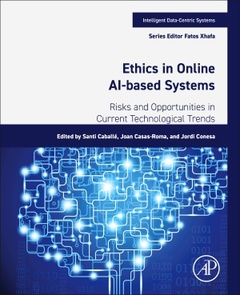Ethics in Online AI-Based Systems Risks and Opportunities in Current Technological Trends Intelligent Data-Centric Systems Series
Coordonnateurs : Caballé Santi, Casas-Roma Joan, Conesa Jordi

Ethics in Online AI-Based Systems: Risks and Opportunities in Current Technological Trends creates a space to explore the ethical relevance that new technologies under development may have. Stimulating reflection and considerations with respect to the design, deployment, and use of technology helps readers guide current and future technological advancements from an ethically informed position to ensure that such advancements contribute towards solving current global and social challenges that we, as a society, have today. This will not only be useful for researchers and professional engineers, but also for educators, policy makers, and ethicists. Recent technological advancements have deeply transformed society and the way people interact with each other. Instantaneous communication platforms have allowed connections with other people, forming global communities and creating unprecedented opportunities in many sectors, making access to online resources more ubiquitous by reducing limitations imposed by geographical distance and temporal constrains. These technological developments bear ethically relevant consequences with their deployment, and legislations often lag behind such advancements. Because the appearance and deployment of these technologies happen much faster than legislative procedures, the way these technologies affect social interactions have profound ethical effects before any legislative regulation can be built in order to prevent and mitigate those effects.
PART I: Ethical Implications of Artificial Intelligence in Applications for Education 1. Adverse effects of intelligent support in CSCL - The Ethics of Conversational Agents 2. Navigating the Ethical Landscape of Multimodal Learning Analytics: A Guiding Framework 3. Ethics in Online AI-Based Assessment Systems 4. Ethical aspects regarding automatic emotion recognition used in online learning environments 5. Data-Driven Educational Decision-Making Model to Curriculum Optimization PART II: Ethical Implications of Artificial Intelligence in Autonomous Services and Systems 6. The Ethical Issues Raised By The Use Of AI Products For The Disabled: An Analysis By Two Disabled People 7. The Implications of Ethical Perspectives in AI and Autonomous Systems 8. The ethics of online AI-driven agricultural and food systems 9. AI and grief. A prospective study on the ethical and psychological implications of deathbots PART III: Ethical Implications of Artificial Intelligence Models and Experiences 10. On pitfalls (and advantages) of sophisticated Large Language Models 11. Perspectives on the Ethics of a VR- based Empathy Experience for Educators 12. Assessing and Implementing Trustworthy AI Across Multiple Dimensions 13. Artificial Intelligence and Basic Human Needs: The Shadow Aspects of Emerging Technology 14. Beyond Artificial Intelligence (AI) Ethics: Exploring Empathetic Ethical Outcomes for AI PART IV: Ethical Implications of Artificial Intelligence in Social and Political Involvement 15. Who Decides What Online and Beyond: Freedom of Choice in Predictive Machine-Learning Algorithms 16. The hard problem of the androcentric context of AI: Challenges for EU policy agendas 17. Curse of the Cyborg Mammoths: The Use of Artificial Intelligence in Manipulating and Mobilizing Human Emotions 18. On Deterring Hate Speech, Whilst Maximising Security and Privacy
Joan Casas-Roma is a postdoctoral research fellow at the Universitat Oberta de Catalunya, where he works on AI and ethics in the context of online education. He received his PhD in Knowledge and Information Society from the Universitat Oberta de Catalunya on the areas of formal logic and philosophy of mind. He is also a lecturer at Falmouth University (UK), teaching and leading different modules on design, theory, and computing for digital games. His research interests concern the areas of AI ethics and ethics of technology, as well as different topics in ethics and moral philosophy and philosophy of AI. He has published several papers in international conferences and journals, participated in national research projects in collaboration with other universities, and has participated in the organization and chairing of various conferences.
Jordi Conesa is an associate professor of computer science at the Universitat Oberta de Catalunya. He received his PhD in software engineering from the Technical University of Catalonia, after a research stay in Georgia State University of Atlanta (US). His research interest concerns the areas of conceptual modelling, ontolo
- Investigates how "intelligent" technological advances might be used, how they will affect social interactions, and what ethical consequences they might have for society
- Identifies and reflects on questions that need to be asked before the design, deployment, and application of upcoming technological advancements, aiming to both prevent and mitigate potential risks, as well as to identify potentially ethically-beneficial opportunities
- Recognizes the huge potential for ethically-relevant outcomes that technological advancements have, and take proactive steps to anticipate that they be designed from an ethically-informed position
- Provides reflections that highlight the importance of the relationship between technology, their users and our society, thus encouraging informed design and educational and legislative approaches that take this relationship into account
Date de parution : 04-2024
Ouvrage de 424 p.
19x23.3 cm
